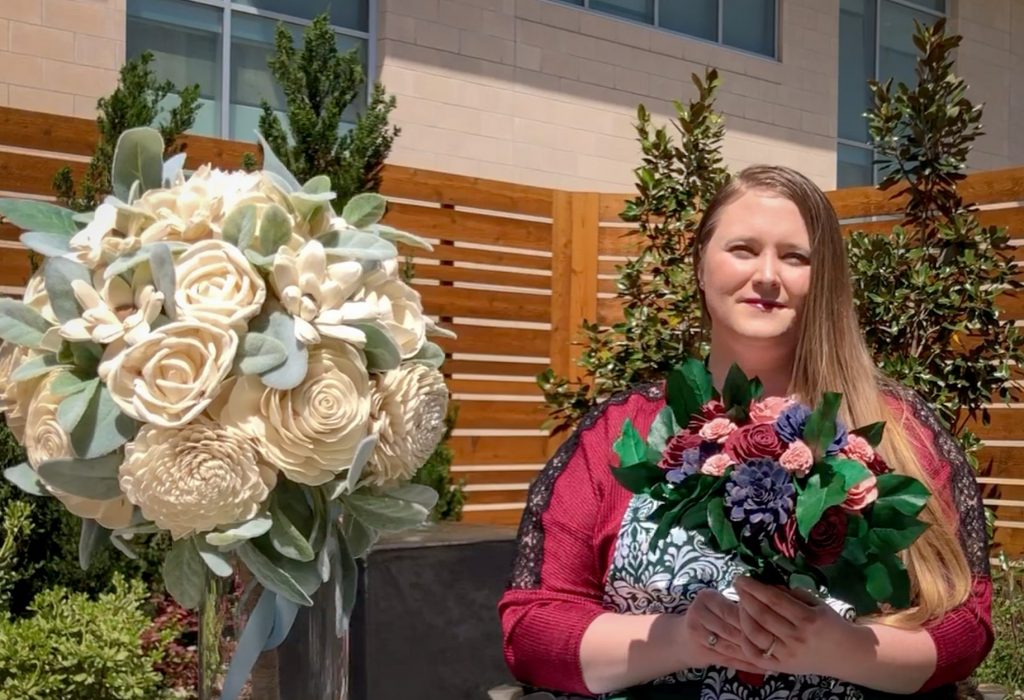For Emily Chrastka BS’16, Creating Eco-friendly Flowers is a Science
By: Development Communications | May 9, 2019
Alumni News

As a neuroscience student at UT Dallas, Emily Chrastka BS’16 was focused on one thing — earning her degree. During her time as an undergraduate, the aspiring doctor and Army veteran committed to a demanding course load until she earned her bachelor’s degree in 2016. But her plans for medical school came to a halt when she found out she was pregnant with her second child.
Instead of pursuing a career in the medical field, Chrastka found herself at home caring for two kids. With so much time devoted to her children and looking for ways to unwind, Chrastka turned to an old pastime she had discovered while a student at UT Dallas. During her final semester, Chrastka stumbled across a Facebook post about making wood flowers, and she was intrigued.
“I watched a lot of tutorials on how to build the flowers,” Chrastka said. “Then I sat down and painted them, and put them in a little arrangement.”
Her first foray into making the environmentally friendly blooms was a success, so she continued to play with different designs and painting techniques until she found her rhythm.
“With math and science, you’re very focused and concentrated on what you’re doing,” Chrastka said. “With this, it’s relaxing. I equate it to reading a book.”
Although Chrastka had no background or prior experience in this art form, what started as a hobby turned into a side gig in 2018, when she finally had the time and energy to invest in the business.
“As a parent, I started making them for teachers’ gifts,” Chrastka said. “I loved doing it, and I realized there was a market for it.”
So in August 2018, Chrastka created The Enchanted Rose Floral Co. Now close to a year in business, Chrastka has channeled her tenacity as a student at UT Dallas into her newfound career as an entrepreneur and business owner. The Dallas-based company specializes in sustainable and ethically sourced wood byproducts, all used to create long-lasting wood flowers and arrangements for weddings, holidays, corporate events and special occasions.
“I think any first year is hard, just because there are a lot of moving parts to starting a business and creating marketing and advertising,” Chrastka said. “But all in all, it’s been great.”
The company uses wood made from bamboo, tapioca and yucca sourced from Southeast Asia. The material is drought resistant and doesn’t require the use of pesticides or fertilizer, unlike traditional cut flowers. The wood flowers can also be grown within one to three years, a fast turnaround compared to regular trees.
“My husband buys me flowers all the time, and they have a shelf life of about seven days,” Chrastka said. “We can make a product that looks similar, but will last forever.”
Chrastka not only creates custom bouquets for clients, but she can also recreate bridal bouquets and replicas of flowers that are unique or out-of-season. She paints each bloom with a dip-dye technique, as well as a detailed, multi-colored approach with a paintbrush for more delicate flowers like lilies.
“You can have your flowers preserved, but they don’t always last,” Chrastka said.
Chrastka was recently hired to create arrangements and a “bouquet buffet” for a Ladies in Leadership Luncheon at Amegy Bank in downtown Dallas.
“The event was based on women who are C-level executives and entrepreneurs, and celebrating the struggles and successes they’ve had to go through,” Chrastka said. “It’s been exciting to work with people from different areas of business and put my product out in front of them.”
Although Chrastka’s career trajectory didn’t pan out the way she expected, she credits UTD for preparing her for the grueling life of an entrepreneur.
“Having those 18-hour semesters really teaches you to have that drive to own your own business,” Chrastka said. “There are no weekends off; there are long hours and no vacations. You’re all there is.”
After serving as a combat medic in the U.S. Army from 2009 to 2012, Chrastka has been able to use resources available to veterans that have also attributed to her success. In the past year, she attended the Entrepreneurship Bootcamp for Veterans (EBV), a training initiative for post-9/11 veterans to help provide them with the tools to build their own careers and businesses.
“It’s just for veterans,” she said. “They can come in and teach the basics of entrepreneurship and link us with resources, so that’s been a huge help.”
She hopes to use what she’s learned in the future to employ disabled female veterans and to continue to push her eco-friendly message forward.
“With any industry, you can’t go it alone,” Chrastka said. “Part of my goal is to educate the public that this option is out there for them.”